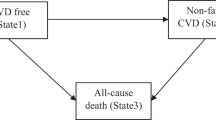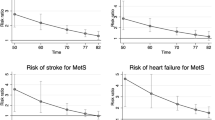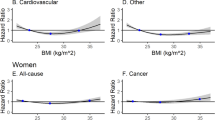Abstract
Objective
To estimate the risk of cardiovascular disease (CVD) in older adults with overweight or obesity without metabolic risk factors using a Bayesian survival analysis.
Design
Prospective cohort study with median follow-up of 9.7 years.
Setting
Newcastle, New South Wales, Australia.
Participants
A total of 2313 community-dwelling older men and women.
Intervention/exposure
Participants without known CVD and with a body mass index (BMI) ≥ 18.5 kg m2 were stratified by BMI and metabolic risk to create six BMI-metabolic health categories. Metabolic risk was defined according to the International Diabetes Federation criteria for metabolic syndrome. ‘Metabolically healthy’ was defined as absence of metabolic risk factors. Bayesian survival analysis, incorporating prior information from a previously published meta-analysis was used to assess the effect of BMI-metabolic health categories on time from recruitment to CVD.
Main outcome
Incident physician-diagnosed CVD, defined as fatal or nonfatal myocardial infarction, fatal or nonfatal stroke, angina, or coronary revascularisation procedure, was determined by linkage to hospital admissions records and Medicare Australia data. Secondary outcomes were cardiovascular mortality and all-cause mortality.
Results
From 2313 adults with complete metabolic health data over a median follow-up of 9.7 years, 283 incident CVD events, 58 CVD related deaths and 277 deaths from any cause occurred. In an adjusted Bayesian survival model of complete cases with informative prior and metabolically healthy normal weight as the reference group, the risk of CVD was increased in metabolically healthy overweight (HR = 1.52, 95% credible interval 0.96–2.36), and in metabolically healthy obesity (HR = 1.86, 95% credible interval 1.14–3.08). Imputation of missing metabolic health and confounding data did not change the results.
Conclusion
There was increased risk of CVD in older adults with overweight or obesity, even in the absence of any metabolic abnormality. This argues against the notion of ‘metabolically healthy’ overweight or obesity.
This is a preview of subscription content, access via your institution
Access options
Subscribe to this journal
Receive 12 print issues and online access
$259.00 per year
only $21.58 per issue
Buy this article
- Purchase on Springer Link
- Instant access to full article PDF
Prices may be subject to local taxes which are calculated during checkout


Similar content being viewed by others
Data availability
The datasets generated during and/or analysed during the current study are available from the corresponding author on reasonable request.
References
Abarca-Gómez L, Abdeen ZA, Hamid ZA, Abu-Rmeileh NM, Acosta-Cazares B, Acuin C, et al. Worldwide trends in body-mass index, underweight, overweight, and obesity from 1975 to 2016: a pooled analysis of 2416 population-based measurement studies in 128· 9 million children, adolescents, and adults. Lancet. 2017;390:2627–42.
Ginsberg HN, MacCallum PR. The obesity, metabolic syndrome, and type 2 diabetes mellitus pandemic: Part I. Increased cardiovascular disease risk and the importance of atherogenic dyslipidemia in persons with the metabolic syndrome and type 2 diabetes mellitus. J Cardiometab Syndr. 2009;4:113–9.
Tabarés Seisdedos R. Health effects of overweight and obesity in 195 countries over 25 years. N Engl J Med. 2017;377:13–27.
Finkelstein EA, Brown DS, Wrage LA, Allaire BT, Hoerger TJ. Individual and aggregate years‐of‐life‐lost associated with overweight and obesity. Obesity. 2010;18:333–9.
Peeters A, Barendregt JJ, Willekens F, Mackenbach JP, Mamun AA, Bonneux L. Obesity in adulthood and its consequences for life expectancy: a life-table analysis. Ann Intern Med. 2003;138:24–32.
Lung T, Jan S, Tan EJ, Killedar A, Hayes A. Impact of overweight, obesity and severe obesity on life expectancy of Australian adults. Int J Obes. 2019;43:782–9.
Fontaine KR, Redden DT, Wang C, Westfall AO, Allison DB. Years of life lost due to obesity. JAMA. 2003;289:187–93.
Stefan N, Häring H-U, Hu FB, Schulze MB. Metabolically healthy obesity: epidemiology, mechanisms, and clinical implications. Lancet Diabetes Endocrinol. 2013;1:152–62.
Stefan N, Kantartzis K, Machann J, Schick F, Thamer C, Rittig K, et al. Identification and characterization of metabolically benign obesity in humans. Obstetr Gynecol Survey. 2009;64:30–1.
Wildman RP, Muntner P, Reynolds K, McGinn AP, Rajpathak S, Wylie-Rosett J, et al. The obese without cardiometabolic risk factor clustering and the normal weight with cardiometabolic risk factor clustering: prevalence and correlates of 2 phenotypes among the US population (NHANES 1999–2004). Arch Intern Med. 2008;168:1617–24.
Hinnouho GM, Czernichow S, Dugravot A, Nabi H, Brunner EJ, Kivimaki M, et al. Metabolically healthy obesity and the risk of cardiovascular disease and type 2 diabetes: the Whitehall II cohort study. Eur Heart J. 2015;36:551–9.
Appleton SL, Seaborn CJ, Visvanathan R, Hill CL, Gill TK, Taylor AW, et al. Diabetes and cardiovascular disease outcomes in the metabolically healthy obese phenotype: a cohort study. Diabetes Care. 2013;36:2388–94.
Arnlov J, Ingelsson E, Sundstrom J, Lind L. Impact of body mass index and the metabolic syndrome on the risk of cardiovascular disease and death in middle-aged men. Circulation. 2010;121:230–6.
Aung K, Lorenzo C, Hinojosa MA, Haffner SM. Risk of developing diabetes and cardiovascular disease in metabolically unhealthy normal-weight and metabolically healthy obese individuals. J Clin Endocrinol Metab. 2014;99:462–8.
Caleyachetty R, Thomas GN, Toulis KA, Mohammed N, Gokhale KM, Balachandran K, et al. Metabolically healthy obese and incident cardiovascular disease events among 3.5 million men and women. J Am Coll Cardiol. 2017;70:1429–37.
Eckel N, Li Y, Kuxhaus O, Stefan N, Hu FB, Schulze MB. Transition from metabolic healthy to unhealthy phenotypes and association with cardiovascular disease risk across BMI categories in 90 257 women (the Nurses’ Health Study): 30 year follow-up from a prospective cohort study. Lancet Diabetes Endocrinol. 2018;6:714–24.
Hansen L, Netterstrom MK, Johansen NB, Ronn PF, Vistisen D, Husemoen LLN, et al. Metabolically healthy obesity and ischemic heart disease: a 10-year follow-up of the inter99 study. J Clin Endocrinol Metab. 2017;102:1934–42.
Twig G, Gerstein HC, Shor DBA, Derazne E, Tzur D, Afek A, et al. Coronary artery disease risk among obese metabolically healthy young men. Eur J Endocrinol. 2015;173:305–12.
Dhana K, Koolhaas CM, van Rossum EF, Ikram MA, Hofman A, Kavousi M, et al. Metabolically healthy obesity and the risk of cardiovascular disease in the elderly population. PLoS ONE. 2016;11:e0154273.
Hamer M, Stamatakis E. Metabolically healthy obesity and risk of all-cause and cardiovascular disease mortality. J Clin Endocrinol Metab. 2012;97:2482–8.
Lee H, Choi E, Lee S, Kim Y, Han K, Oh S. Risk of ischemic stroke in metabolically healthy obesity: a nationwide population-based study. PLoS One. 2018;13:e0195210.
Meigs JB, Wilson PW, Fox CS, Vasan RS, Nathan DM, Sullivan LM, et al. Body mass index, metabolic syndrome, and risk of type 2 diabetes or cardiovascular disease. J Clin Endocrinol Metab. 2006;91:2906–12.
Kramer CK, Zinman B, Retnakaran R. Are metabolically healthy overweight and obesity benign conditions? A systematic review and meta-analysis. Ann Intern Med. 2013;159:758–69.
Fan J, Song Y, Chen Y, Hui R, Zhang W. Combined effect of obesity and cardio-metabolic abnormality on the risk of cardiovascular disease: a meta-analysis of prospective cohort studies. Int J Cardiol. 2013;168:4761–8.
Zheng R, Zhou D, Zhu Y. The long-term prognosis of cardiovascular disease and all-cause mortality for metabolically healthy obesity: a systematic review and meta-analysis. J Epidemiol Community Health. 2016;70:1024–31.
Eckel N, Meidtner K, Kalle-Uhlmann T, Stefan N, Schulze MB. Metabolically healthy obesity and cardiovascular events: a systematic review and meta-analysis. Eur J Prev Cardiol. 2015;23:956–66.
Guo F, Garvey WT. Cardiometabolic disease risk in metabolically healthy and unhealthy obesity: stability of metabolic health status in adults. Obesity. 2016;24:516–25.
Opio J, Croker E, Odongo GS, Attia J, Wynne K, McEvoy M. Metabolically healthy overweight/obesity are associated with increased risk of cardiovascular disease in adults, even in the absence of metabolic risk factors: a systematic review and meta-analysis of prospective cohort studies. Obesity Rev. 2020;21:e13127.
McEvoy M, Smith W, D’Este C, Duke J, Peel R, Schofield P, et al. Cohort profile: the Hunter community study. Int J Epidemiol. 2010;39:1452–63.
Hoddinott SN, Bass MJ. The dillman total design survey method. Can Fam Physician. 1986;32:2366.
Alberti KGMM, Zimmet PF. Definition, diagnosis and classification of diabetes mellitus and its complications. Part 1: diagnosis and classification of diabetes mellitus. Provisional report of a WHO consultation. Diabetic Med. 1998;15:539–53.
Howards PP, Schisterman EF, Poole C, Kaufman JS, Weinberg CR. “Toward a clearer definition of confounding” revisited with directed acyclic graphs. Am J Epidemiol. 2012;176:506–11.
Bowden JA, Delfabbro P, Room R, Miller CL, Wilson C. Alcohol consumption and NHMRC guidelines: has the message got out, are people conforming and are they aware that alcohol causes cancer? Aust NZ J Public Health. 2014;38:66–72.
Royston P, Carlin JB, White IR. Multiple imputation of missing values: new features for mim. Stata J. 2009;9:252–64.
Yuan YC. Multiple imputation for missing data: concepts and new development (Version 9.0). SAS Institute Inc, Rockville, MD. 2010;49:12.
Bürkner P-C. Advanced Bayesian Multilevel Modeling with the R Package BRMS. R Journal. 2018;10:395–411.
StataCorp L Stata: Statistics/data analysis (Version 16). College Station, TX: StataCorp LLC. 2019.
Hyun-Jung L, Choi E-K, Lee S-H, Yong-Jin K, Kyung-Do H, Oh S. Risk of ischemic stroke in metabolically healthy obesity: a nationwide population-based study. PLoS One. 2018;13:e0195210.
Hosseinpanah F, Barzin M, Sheikholeslami F, Azizi F. Effect of different obesity phenotypes on cardiovascular events in Tehran Lipid and Glucose Study (TLGS). Am J Cardiol. 2011;107:412–6.
Morkedal B, Vatten LJ, Romundstad PR, Laugsand LE, Janszky I. Risk of myocardial infarction and heart failure among metabolically healthy but obese individuals: HUNT (Nord-Trondelag Health Study), Norway. J Am Coll Cardiol. 2014;63:1071–8.
Bo S, Musso G, Gambino R, Villois P, Gentile L, Durazzo M, et al. Prognostic implications for insulin-sensitive and insulin-resistant normal-weight and obese individuals from a population-based cohort. Am J Clin Nutr. 2012;96:962–9.
Katzmarzyk PT, Church TS, Janssen I, Ross R, Blair SN. Metabolic syndrome, obesity, and mortality: impact of cardiorespiratory fitness. Diabetes Care. 2005;28:391–7.
Lassale C, Tzoulaki I, Moons KGM, Sweeting M, Boer J, Johnson L, et al. Separate and combined associations of obesity and metabolic health with coronary heart disease: a pan-European case-cohort analysis. Eur Heart J. 2018;39:397–406.
Lu J, Bi Y, Wang T, Wang W, Mu Y, Zhao J, et al. The relationship between insulin-sensitive obesity and cardiovascular diseases in a Chinese population: Results of the REACTION study. Int J Cardiol. 2014;172:388–94.
Mirzaei B, Abdi H, Serahati S, Barzin M, Niroomand M, Azizi F, et al. Cardiovascular risk in different obesity phenotypes over a decade follow-up: Tehran lipid and glucose study. Atherosclerosis. 2017;258:65–71.
Song Y, Manson JE, Meigs JB, Ridker PM, Buring JE, Liu S. Comparison of usefulness of body mass index versus metabolic risk factors in predicting 10-year risk of cardiovascular events in women. Am J Cardiol. 2007;100:1654–8.
Thomsen M, Nordestgaard BG. Myocardial infarction and ischemic heart disease in overweight and obesity with and without metabolic syndrome. JAMA Intern Med. 2014;174:15–22.
Ortega FB, Cadenas-Sanchez C, Migueles JH, Labayen I, Ruiz JR, Sui X, et al. Role of physical activity and fitness in the characterization and prognosis of the metabolically healthy obesity phenotype: a systematic review and meta-analysis. Prog Cardiovasc Dis. 2018;61:190–205.
Yeh T-L, Chen H-H, Tsai S-Y, Lin C-Y, Liu S-J, Chien K-L. The relationship between metabolically healthy obesity and the risk of cardiovascular disease: a systematic review and meta-analysis. J Clin Med. 2019;8:1228.
LeFevre ML. Behavioral counseling to promote a healthful diet and physical activity for cardiovascular disease prevention in adults with cardiovascular risk factors: US Preventive Services Task Force Recommendation Statement. Ann Intern Med. 2014;161:587–93.
Ortega FB, Lee DC, Katzmarzyk PT, Ruiz JR, Sui X, Church TS, et al. The intriguing metabolically healthy but obese phenotype: cardiovascular prognosis and role of fitness. Eur Heart J. 2013;34:389–97.
Acknowledgements
This work was a collaboration between the Hunter Community Study and the Australian Rural Mental Health Study, named xTEND. The xTEND project was funded by the Hunter Medical Research Institute and Beyondblue, the national depression initiative. The Hunter Community Study has been funded by the University of Newcastle Strategic Initiative Fund, the Vincent Family Foundation, and the Brawn Fellowship. The Australian Rural Mental Health Study was funded by the National Health and Medical Research Council (NHMRC, Project Grants #401241 and #631061) and also supported by a Research Infrastructure Capacity Building Grant from NSW Department of Health to the Australian Rural Health Research Collaboration.
Author information
Authors and Affiliations
Contributions
MM was the study lead investigator. MM, KW, JO planned the study. MM, KW supervised progress of the study. JO reviewed literature and contributed to data analysis. MM, JO wrote the paper. JA was lead investigator for the Hunter Community Study. SH prepared data for analysis. SO performed data analysis. MM, JO wrote the paper. All authors reviewed the paper from draft to completion.
Corresponding author
Ethics declarations
Competing interests
No conflict of interest was declared by the authors in relation to the research, authorship and publication of this study.
Additional information
Publisher’s note Springer Nature remains neutral with regard to jurisdictional claims in published maps and institutional affiliations.
Supplementary information
Rights and permissions
Springer Nature or its licensor (e.g. a society or other partner) holds exclusive rights to this article under a publishing agreement with the author(s) or other rightsholder(s); author self-archiving of the accepted manuscript version of this article is solely governed by the terms of such publishing agreement and applicable law.
About this article
Cite this article
Opio, J., Wynne, K., Attia, J. et al. Overweight or obesity increases the risk of cardiovascular disease among older Australian adults, even in the absence of cardiometabolic risk factors: a Bayesian survival analysis from the Hunter Community Study. Int J Obes 47, 117–125 (2023). https://doi.org/10.1038/s41366-022-01241-w
Received:
Revised:
Accepted:
Published:
Issue Date:
DOI: https://doi.org/10.1038/s41366-022-01241-w
This article is cited by
-
Association between metabolic syndrome and myocardial infarction among patients with excess body weight: a systematic review and meta-analysis
BMC Public Health (2024)
-
Body Mass Index Asian populations category and stroke and heart disease in the adult population: a longitudinal study of the Indonesia Family Life Survey (IFLS) 2007 and 2014
BMC Public Health (2023)



